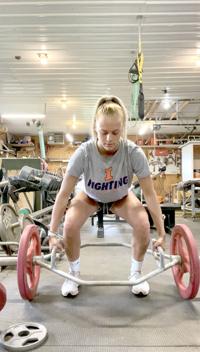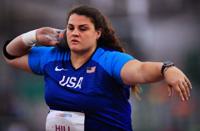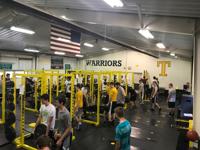
Illinois volleyball player Mica Allison, a St. Thomas More graduate, works out Thursday in Mahomet.
The Illinois volleyball player: ‘The new normal is not going to be what we’ve been used to’
Mica Allison and Rylee Hinton went on a drive last week.
A lengthy one. The two Illinois volleyball teammates who starred at Champaign County high schools — Allison is a St. Thomas More graduate graduated early in Decemember 2017 and who calls White Heath home and Hinton graduated early from Champaign Central in December 2018 to join the Illini after a standout prep career with the Maroons — ventured down to New Orleans.
The purpose of the trip: to see fellow Illini teammate Ellie Holzman.
And to also play some volleyball.
Albeit in a different manner than they’re accustomed to.
“We were at her house,” Allison said. “She has a net in her backyard, so obviously playing on the grass is a little different, but it still does the same thing, so that’s what we did.”
It was a welcome respite for Allison, who has stayed mostly at home in White Heath during the coronavirus pandemic.
“That was actually really nice just getting to play volleyball with two other people on a net doing absolutely nothing but setting and hitting,” Allison said. “It felt so good.”
Allison is back home in White Heath now, where she has spent the better part of 2020.
The 6-foot-1 junior setter, who played with the Illini in 2019 after spending her freshman season in 2018 at Auburn before transferring to Illinois, had an apartment with former Illini teammates Jacqueline Quade and Caroline Welsh last fall.
But ...
“We had a lot of problems with our apartment,” Allison said. “Caroline actually moved into a different apartment because we had so many problems, and I thought, ‘Well, I could live at home for the spring semester just to save a few bucks, so I ended up doing it.”
Not realizing, at the time when she made that decision, she wouldn’t spend much time on the UI campus so far in 2020. Classes were moved online in mid-March in response to the pandemic.
“Driving to and from campus wasn’t bad,” Allison said. “People think since I live out here in White Heath, that it’s in a different state, but it’s about a 10-minute drive for me to campus. I’m just glad I’m not spending money on an apartment that I’m not actually living in.”
So the past 12 weeks have meant even more quality time for Allison with her parents, Barry and Kim, along with her older sister, Leah, a softball pitcher at Toledo who was in the midst of her senior season with the Rockets when the pandemic struck.
They’ve included some volleyball time outside at the family house.
Kim is about to start her third season in charge of the Monticello High School volleyball program, while Leah did play the sport at STM, too.
“My sister hasn’t quite lost her volleyball touch, but it’s a little shaky,” Mica said with a laugh. “I’ve been playing a lot with her, actually, which is nice. They hit to me and they’re not very consistent, so it’s good getting to dig balls from everywhere.”
The quarantine has also allowed Allison to binge-watch some shows on Netflix — her current favorite is ‘Outer Banks’ — and stay busy with family cards games. Namely euchre.
“We play card games every night basically,” Allison said. “We have a big euchre tournament that’s been going on since the start of quarantine, and we’ve played about 75 games so far. Our parents have beaten us a lot.”
While she’s getting prepped for the upcoming Illinois volleyball season the best possible way she can by doing drills with her family at home and working out as well, Allison understands the 2020 volleyball season will be unlike anything she’s ever gone through.
That’s the constant message from Illinois coach Chris Tamas in Zoom meetings with his team.
“The biggest thing they’re trying to get in our heads right now is the new normal is not going to be what we’ve been used to,” Allison said. “We’re going to have to get used to being uncomfortable because it’s not going to be like anything we’ve ever experienced before. The guidelines are saying you have to use the same ball throughout the whole practice, and with volleyball, you don’t do that, so it’s going to be interesting, like sanitizing our balls after we touch them. I have no idea what’s to come, but it will for sure be different.”
Plus, volleyball is an emotionally-charged sport. The ebbs and flows of a match can hinge directly on the environment the players are competing in. A sold-out Huff Hall on the UI campus is notably different than an empty Huff Hall. It’s a thought Allison has tried to push out of her mind during the entire pandemic: playing volleyball in front of no spectators.
“I don’t want it to happen,” Allison said. “It’d be really weird. It’d be basically like everything is a scrimmage. It would be really hard to have the whole energy and the whole atmosphere if no one is there in attendance. I’m really hoping that there are fans, but it’s the reality of this whole situation honestly.”
Until Illinois opens its season — the Illini haven’t publicly released their 2020 schedule yet, but their first match is typically around Labor Day weekend in early September — Allison keeps approaching like she’ll play in 2020 for Illinois. The News-Gazette’s 2017 All-Area Player of the Year after leading STM to a Class 2A state title has adjusted so far during her college career.
From starting every match at setter for Auburn during the 2018 season and handing out 1,055 assists to earn All-SEC freshman honors to finding a new role at Illinois, moving from setter to opposite hitter last season en route to 119 kills, Allison has adapted before. Never like she and her teammates will have to, though, in order to play a sport they cherish this upcoming fall.
“I actually talked to my friends from other schools about when it all first happened, we were like, ‘Oh my gosh, a little break,’” Allison said. “I felt a little guilty after a while for feeling that way. This is going to be a whole new way to work on other aspects of the game, not just the physical side. I feel like I’ve definitely used this whole time for the best. It’s made me think, ‘If volleyball is taken away from my life, what am I going to do without it? This time has been a huge growth time for me.”

ballard
The sports medicine doctor: ‘It’s been a rollercoaster processing everything’
The spring usually features Randy Ballard and his sports medicine staff at the University of Illinois working with their respective spring sports while preparing any sort of rehabilitation plans for other athletes getting ready to end the school year.
Obviously, this spring has featured none of those moments happening because of the coronavirus pandemic.
Instead, Ballard has helped spearhead a plan — in conjunction with his fellow sports medicine colleagues at Illinois, Illinois athletic director Josh Whitman, UI campus leadership, the Champaign-Urbana Public Health District, the McKinley Health Center and Carle Foundation Hospital, for allowing Illinois football and men’s basketball student-athletes to return to campus later this month for voluntary strength and conditioning workouts.
“We’ll have our first wave coming back next week,” said Ballard, the associate director of athletics for sports medicine and integrated performance at Illinois since May 2016. “Over the following few weeks, we’ll welcome back subsequent groups. Josh and all of us have made this really clear to the student-athletes: this is completely voluntary. They don’t have to come if they’re not comfortable coming.”
Ballard said a “robust plan” is in place to ensure the health of Illinois student-athletes. A large part of said plan involves testing. But it’s just not that simple.
“It depends on your definition of testing, and that’s been another big challenge for us,” Ballard said. “The nomenclature and the words we use, some people are using different words to describe different things.”
At Illinois, here is what Ballard said will be in place this month with basketball players working out at the Ubben Basketball Complex and football players working out at the Smith Center:
—When the student-athletes return to the UI campus, they’ll go through a full screening that includes a test for COVID-19, an antibody test and an antigen test.
— Then, the student-athletes will be quarantined for a period of time before testing takes place again. “Until we have two negative test results for antigen to know they’re not for sure active carriers, we’re not going to let them go back to their own apartments,” Ballard said. “We won’t let them in shared spaces. We won’t let them in our facilities.”
— Once that process is complete, student-athletes and staff will be expected to fill out a questionnaire each morning acknowledging they don’t have any COVID-19 symptoms. “Once they fill that out,” Ballard said, “it’ll be very orchestrated in terms of a set time they’ll come to our facility.”
— Student-athletes will have to arrive at the facility wearing a mask or face covering. “They won’t be allowed in our facilities without masks and hand sanitization and proper hygience,” Ballard said. “Once they arrive at our door, there will be a temperature screening and other screenings that will transpire before they come into our facility to try and identify anybody who may be asymptomatic carriers.”
Ballard said the hope is the daily process will eventually morph into a weekly process, but advised the plans are subject to change as the ever-evolving fluid nature of the pandemic has shown during the last 12 weeks.
Which lends to another question: how will Illinois respond if a student-athlete tests positive for COVID-19?
“We all have to be expected and prepared to have people test positive when they come back to campus,” Ballard said. “We’ll follow public health and CDC guidelines in terms of quarantining them for 14 days, monitoring their symptoms and communicating with them on a daily basis. We have a very thorough plan in terms of that piece, and the biggest and most important piece of that is they will be isolated immediately so that we’re not chancing any spread.”
Ballard said deep cleaning has taken place at Illinois athletic facilities recently after all facilities were locked down in the initial aftermath of the pandemic.
“No one was allowed in the facilities. Now, for the last weeks, our facility attendants and staff have been in the buildings doing a deep cleaning,” he said. “We’ve put a robust plan in place in terms of the frequency of the cleaning and how things are getting cleaned. We’re limiting access to facilities so we know once they’re cleaned at the end of the day, that no one else will be there until the next group during the next day.”
It’s a laborious, time-intensive process Ballard and his staff have had to undertake since college sports ground to a halt on March 12. Ballard said the number of different proposals and draft documents they’ve created in getting student-athletes back on campus during these uncertain times is numerous.
“One of the biggest challenges is as sports medicine practitioners, we’re really pushed to be very thorough and complete and certain with our diagnosis,” Ballard said. “Obviously, there’s never true certainty, but if you tug on an ACL, you know that it’s torn. If you get an MRI, you can see that an ACL is torn. With COVID, you don’t know because someone can be asymptomatic. In terms of putting together a plan in place, there is no best practice documents about what to do. That’s been one of the big challenges is figuring out who to listen to, who else other people are listening to and talking to people across the country from various entities to figure out who they’re talking to and what they’re thinking.”
Throughout this entire ordeal, Ballard, who has worked at Illinois for 15 years and was an athletic trainer for USA Track and Field at the 2008 Summer Olympics in Beijing, has praised the guidance shown from Whitman. He is in daily communication with the Illini athletic director.
“I always answer his calls,” Ballard said with a laugh. “It’s a tremendous relationship and I’m grateful for his leadership. To that extent, C-U Public Health, McKinley Health Center and our Carle partners have been tremendous to work with as well.”
So when Ballard starts seeing some Illinois student-athletes return shortly, he might feel a variety of emotions. It’s understandable given nothing like this pandemic has ever happened before in his lifetime.
“It’s been a rollercoaster processing everything,” he said. “For the vast majority of sports medicine staff and personnel, we truly feel that we’re put here to serve our student-athletes. While at times, it’s a lot, but as long as we keep our focus on the student-athletes, it gives us hope and gives us the drive to do what we need to do to support them to be successful.”

Provided
Former Mahomet-Seymour standout Dani Bunch Hill has had to put her competitive throwing plans in track and field on hold because of the coronavirus pandemic.
The aspiring Olympian: ‘It’s been tough trying to decide’
Daniella Bunch Hill thought 2020 would provide one of the most noteworthy years of her life.
Competing at the Summer Olympics in Tokyo if she made the U.S. team.
The coronavirus pandemic canceled those plans for the Mahomet native when the Tokyo Games were postponed in late March to July 2021.
Putting Hill’s life in an entirely different direction the last 12 weeks. And in subsequent months for the 29-year-old Hill, who lives in Grand Haven, Mich., with her husband, Zack.
“I planned on retiring following the 2020 season to start a family with my husband and move on to the working world,” said Hill, a 2009 Mahomet-Seymour High School graduate who won two state shot put titles with the Bulldogs before becoming an eight-time All-American at Purdue before graduating from the Big Ten school in 2014 with a degree in law and society. “The county courthouse is minutes from my home, and I was planning on using my degree and work as a court clerk. With the idea of stretching that out for another year, my family and I are still deciding what would be the best decision. At the moment, I am not planning on retiring.”
Hill’s training is on pause now, and she’s not sure when it’ll resume full bore. She was in her second year of training at a local high school, Zeeland East, whose strength and conditioning coach, Ralph McNeal, was helping with her weightlifting and technique. Neal threw in college and was coached by Illinois track and field coach Mike Turk, while Sam Angell, a former thrower at Michigan State, was also helping coach Hill.
“I have not been able to do much in the way of training,” Hill said. “My training requires intense levels of strength training. Since mid-March I have only been doing cardio, like hiking, walking and stair workouts, which is OK for a strength athlete, but I am really missing that power component I find in the weight room.”
Hill’s husband Zack is well-acquainted with the throwing world, too, having competed in throwing events at Michigan State.
So the support system is in place for Hill to pursue her Olympic dreams. After having competed three different times on the world stage representing the United States, this year was likely going to be Hill’s final chance at making the Olympics.
“I was set to compete in China for two weeks in May, but that was canceled quickly,” Hill said. “By the time the official word came out about the Olympics being postponed, I was pretty well adjusted to the idea that this year would not be going the way I planned.”
Despite the initial disappointment and uncertainty, Hill is trying to make the best of the situation. After competing and training at a high level since her high school days at M-S, Hill has taken advantage of some needed downtime.
“For the first time in years, I have weekends open,” she said. “I can make plans and commit to them. I’ve taken the time to go on camping trips with my husband, travel to Illinois to visit my parents, catch up on home projects and all the things that I normally put off until the fall. Its been amazing living a normal life.”
Still, the pandemic has caused Hill’s opportunity to make money competing at a high level in the shot put. For every star-studded Olympia taking in millions of dollars in endorsements, there’s Olympic hopefuls like Bunch who struggle to make a living off the sport they compete in.
“The majority of athletes make an annual salary of $30,000 in prize money,” Hill said. “That income is based on performance, so if there is a bad day or an injury, bye-bye money. With all the opportunities to compete canceled, there is zero chance of making an income this year.”
Hill has picked up a part-time job, though, during the past 12 weeks. One that she probably didn’t know existed before mid-March.
“I was able to start working as a Shipt Shopper in my current town,” Hill said. “During the pandemic, there has been a huge boost in online grocery shopping, and I found the fast-paced, high-demand position to be very rewarding. I have been able to make a better income as a Shipt Shopper than as a professional athlete. The last few few weeks is the first time in years that I have been free of financial stress.”
The delicate balance of still trying to compete and earn money by finding herself among some of the country’s top shot putters, along with ending her athletic pursuits, settling into a full-time job and raising a family with Zack still gnaw at Hill, though.
“As a female athlete, my dreams to be an Olympian are great, but my dreams of being a mom are greater,” Hill said. “It’s been tough trying to decide what to do.”
If Hill does step back in the throwing ring again, load up her body and then uncork it to hurl a shot put as far as she possibly can, she’ll relish the experience. All the more so because of the experiences she’s had since the pandemic forced a complete change in her life.
“Competing has been a part of my life for 16 years and I took it for granted over the last couple of years,” Hill said. “I believe I would be grateful to step into the circle again. It would be a calming experience, for sure. Having it end so abruptly like it did gives me more appreciation for the next time I can throw.”
Whether that’s again at some point in 2020 is unclear. The 2021 Tokyo Olympics, for now, are still on. And if Hill is able to not only represent her Champaign County hometown, her family and most importantly, her country, one more time on the biggest stage possible for a women’s shot put athlete, she knows the journey will have had plenty of stories along the way.
“I have been fortunate enough as it is to represent Team USA three times on the world level,” Hill said. “Although my ultimate goal was to do it during an Olympic year, I am blessed to have accomplished all that I have up to this point. It is without a doubt my dream to be an Olympian and represent my country on that level.”

Who knows when the entire Tuscola football team can gather again in its own weight room, like it did here in 2017, but the Warriors will likely begin small group workouts early next week.
The high school team: ‘Our kids are itching to lift’
Building a culture is part of Andy Romine’s job.
It’s a strong tenet of why the sixth-year Tuscola football coach has compiled an impressive 52-8 record so far during his tenure with the Warriors.
That means getting his Tuscola football players in the school’s weight room. Often.
“We meet every day during the school year, and they lift three times a week,” Romine said. “They do core stability one day and then we do our agility and plyometric work on the other day. Going back to March 12, I was mega-excited about where we were, maybe more than anything with our young kids. Our young kids were on a roll in the weight room. We were set to test the next week.”
All of those plans, all of those gains and all of those measurements have had to wait. For almost three months because of the coronavirus pandemic.
No weight-room lifting sessions. No agility workouts. No time together.
“I know a lot of our kids were disappointed about not being able to test,” Romine said. “We have some kids who have access to weights and then we’ve got some kids who probably don’t have as much access. I’ve got all my personal stuff loaned out, and we’ve had some people donate stuff. I’ve got a list of kids who said, ‘Hey, if you get more stuff, I want to be on that list.’ Our kids are itching to lift.”
Well, Tuscola football, along with every other high school program in the state that gets permission from its local school district, could have started lifting weights again on Saturday after the IHSA put forth return-to-play guidelines on Friday afternoon.
Which falls ahead of a possible timeline Romine said earlier this week he would like to see in order for the season to possibly kick off in late August.
“If we got going by July 1, I’d feel fine about it,” Romine said. “We’d get a month of lifting weights and a month of getting ready.”
During the past 12 weeks, Romine, who said the Warriors will start these voluntary workouts early next week, has had to keep tabs virtually on his players. That includes monitoring any activities they can do at home to stay in shape ahead of the upcoming season.
“We’ve had some kids who have lost some weight that needed to lose some weight,” Romine said. “We’ve lost the ability to make some gains, but at this point, it can be made up.”
The IHSA guidelines released Friday afternoon deal only with strength and conditioning, like weight-lifting and running, with the workouts strictly being voluntary and to contain no more than 10 people in a group setting.
Any summer 7-on-7 events and different team camps the Warriors may have gone to in the past are on hold. For now.
“Probably more than getting things installed is you get a sense of new kids in your program with veterans in your program, and you’re trying to develop a sense of togetherness,” Romine said of summer workouts. “Sure, you want your kids to learn some stuff about the way you do things and the terminology, but that, to me, is not super pressing. That stuff can be put in later, but I think the important thing is everyone is on the same page.”
One of those aspects is making sure the players are properly conditioned and have gone through strength training prior to the start of any practices and games. Romine said that wasn’t necessarily the case decades ago, but has become the norm in making sure players are in the best possible shape before they start playing football again.
“We’ve gotten so inundated with the acclimatization of sport that I think the medical people really feel like it’s important,” Romine said.
But Romine isn’t just worried about any new marks his offensive linemen can make on the bench press or squat. For a program like the Warriors, who have averaged just shy of 44 points per game with Romine in charge on the sidelines, speed and quickness is just as important.
“Maybe more than anything that I worry about more than strength is just agility and hip flexibility,” Romine said. “When you’re not doing stuff for a long time, that stuff just kind of starts to go away. Our kids do something year-round, without a doubt, because they’re either in another sport or doing something else. I’m sure a lot of our kids, based on my communications with them, are doing things. Whether they’re doing as much as what we would do, probably not, but I’m sure that’s the case with most programs.”

The Raminator is a Monster truck owned by brothers Tim and Mark Hall, whose operation is based out of Thomasboro.
The monster truck: ‘Suddenly, we’ve got all kinds of time’
The Raminator monster truck is an impressive feat of engineering.
Tim Hall and his brother, Mark, know this quite well. Since 1986, in fact, when the brothers, who grew up in Champaign County, started their full-time racing operation.
“We take 2,000 horsepower trucks that weigh 10,000 pounds each and make them fly,” Tim said. “These trucks are part farm equipment, part drag racer and part desert racer combined into one vehicle. They look like giant toy trucks and they can perform amazing feats. The racing is very competitive and intense, and we love it. So do the millions of fans who come out every year to our events.”
Except none of those events have happened in nearly the last three months because of the coronavirus pandemic. When the Hall brothers — who employ four people full-time and a few part-time workers in addition to the duties the brothers perform with Mark as the driver and Tim as the president of Hall Brothers Racing — found out the sports world was coming to a halt, they were far away from Champaign County.
“We were in the middle of a Monster Jam tour when the virus initially broke out,” Tim said. “Part of our team was literally sitting at the Canadian border on their way to a race in Vancouver when we got word that the show was canceled.”
Since then, all events featuring the Raminator and any other monster trucks in the company’s fleet — Tim said they have eight total monster trucks they operate — have either been postponed or canceled, leaving the operation at a standstill.
For Tim, a 57-year-old Rantoul Township High School graduate and 1985 University of Illinois graduate who currently resides in Thomasboro, that has meant an adjustment he didn’t foresee coming this spring or summer.
“We’re used to going in absolute high gear all year-round and there’s never time to get everything done,” Tim said. “Suddenly, we’ve got all kinds of time on our hands. When you’re in the crowd-drawing business and crowds aren’t allowed, business as we know it comes to a complete halt.”
Needless to say, they’re eager to get back to racing. Tim said the Raminator is set to start competing again in about a month.
“Our schedule is pretty jam-packed from the Fourth of July on,” he said. “It’s getting busier every day as events that were postponed due to the virus are being rescheduled. We’ve been racing almost non-stop for the last 34 years, and we are not used to sitting at home.”
The extended time back in Thomasboro, though, has done the Hall brothers some good.
“I never realized I had so many projects that needed doing,” Tim said. “We’ve been doing deep maintenance on the race vehicles and haulers, cleaning and renovating the race shop and taking some time to relax. A couple of us have started working on vehicle restoration projects that we never seemed to have time to get to.”
Projects aside, Tim is more than ready to see his fleet of monster trucks competing and entertaining fans again. Interacting with fans is a vital part of their business.
“Monster truck fans come from all walks of life, and we enjoy talking to them all about our trucks and what we do,” Tim said. “One thing that amazes me is that no matter where we go in the United States, once people find out where we are from, there’s always someone in the crowd who tells us that they were stationed at Chanute Air Force Base or that they went to school at the University of Illinois or that they are somehow tied back to central Illinois. This is true, whether we are in California, Florida, Maine, you name it. There’s always a connection to central Illinois.”

New Illinois womens’ basketball assistant coach Scott Merritt and his wife Ashley, along with the couple’s four children. From left, Sienna, Laila, Isaiah and Mariah.
Provided New Illinois womens’ basketball assistant coach Scott Merritt and his wife Ashley, along with the couple’s four children. From left, Sienna, Laila, Isaiah and Mariah.
The coaching family on the move: ‘I will officially be in Champaign on June 13’
Scott Merritt couldn’t call dibs on the home office inside the Milwaukee house he shares with his wife, Ashley, and their four young children.
That space was already used by Ashley, a lawyer.
So when the new Illinois women’s basketball assistant coach was forced to work from home because of the coronavirus pandemic, a new job wasn’t the only adjustment he had to make.
“I didn’t really have a workspace, so I kind of work wherever I feel like, whether it’s the kitchen table or downstairs in the basement,” Merritt said. “Whatever is most comfortable.”
Merritt and his family, which includes 9-year-old Laila, 7-year-old Isaiah, 5-year-old Mariah and 2-year-old Sienna, are set to arrive in Champaign this upcoming week. One of Merritt’s main priorities after he became a part of Nancy Fahey’s staff in late March after leaving Marquette, aside from getting to know his new players from a distance, was securing housing in his new hometown.
“It’s finally coming to a head because I will be officially in Champaign on June 13,” Merritt said. “My house sold in one day. We found a house out (in Champaign) quickly. That process was easy, but, obviously, within the pandemic it’s hard. Everything was kind of prolonged.”
But at the same time, it gave Merritt and his family more time to get their house in Milwaukee in order and to get prepared for the move to Champaign.
“We didn’t have to up and move right away,” he said. “From that aspect, it was a plus, but at the same time I haven’t been able to get to work, be in the office with the staff, interact with the girls. The hardest part is not being able to meet the girls. I’ve met the staff, but I haven’t met the girls and been able to interact with them. That’s the hard part.”
Of course, any in-person interactions with the players he’ll eventually work with are on hold because of the pandemic. Illinois women’s basketball is one of three programs expected to have players return to campus in July, but that’s strictly for voluntary strength and conditioning workouts.
Zoom meetings, plus regular phone calls and text messages, is the best way for Merritt to develop a rapport right now with the Illini roster.
“But it’s not the same as being in person and having that contact face-to-face,” Merritt said. “It’s what we have right now, and we’ll make the best out of it. There is light at the end of the tunnel with having a timeline when we’ll get back in the gym. That’s helping everyone out. We have developed a really good synergy so far being on Zoom so much and had an incredibly successful first couple months of recruiting.”
For Merritt, this is his first college coaching opportunity outside of his comfort zone at Marquette. He played for the Golden Eagles from 2000-04, starting all 33 games on Marquette’s team, led by Dwyane Wade, that reached the Final Four in 2003. He then embarked upon a professsional playing career overseas before getting into coaching. He spent the last six seasons as an assistant with the Marquette women’s program.
“When I was playing overseas, I wasn’t packing up,” Merritt said. “I was really just packing my bags I had for the year. We always kept a house back home. It’s a little bit different dynamic. When you’re heading to a foreign country for the first time you’re excited, but you’re nervous, because you really don’t know what to expect. When you’re moving within the United States, it’s a little bit easier because you have some sort of idea even if it’s a different city.”
Merritt credits his wife, a Milwaukee native, for playing a large role in the upcoming family move.
“She’s always been the piece that keeps everything flowing smoothly,” Merritt said. “She’s amazing with the paperwork aspect of things and dealing with people to make sure we’re not getting the short end of the stick. She does so much for our family, and she’s been so, so tremendous throughout this whole process.”
The couple’s children have adapted, too, not only about the impending move, but also living amid a pandemic.
“They’re a little bit sad about having to change schools, but they’re very, very excited,” Merritt said. “I think they’re like most kids. They’re a little bit stir crazy at times, but figuring out how to function kind of like kids had to do back in the day — doing a lot more things outside. They’re understanding it and getting it, but there are those days it’s like, ‘Boy, it’s going to be a rough one.’”
Not getting the chance to go out on the road recruiting this spring is another aspect Merritt has had to grapple with. He’s watched more film than he usually does, but not getting to see an in-person evaluation of a recruit play in the spring is something he hopes isn’t around in the future. Especially for recruits who may not have generated that much notoriety yet.
“You can still build relationships with players, but the evaluation piece is so key for those kids who maybe take that next step and maybe they don’t,” Merritt said. “That helps you in your recruiting process. There’s a lot of information that you don’t get not being able to eval, which makes it tough. You can watch film, but the film is high school and they could have improved since high school. It’s tough. But you develop the relationships, and then when we can see the kids, we’ll get out and hit the road hard and see as many kids as often as possible.”
Merritt’s own kids will see plenty of road in the next week. Their dad might not the rest of the summer since the NCAA has put a moratorium on in-person recruiting through July 31. But he may have to bargain with his wife about where he works from the family’s new home.
At least for a little while.
“The kids have gotten to the point where they understand if we’re on calls now it’s like, ‘Hey, I’m on a call. You have to be quiet,’” Merritt said. “A lot of whispering around. They’ve adjusted, so it’s a little bit easier. They’ll still run around. They just won’t scream as loud.”
"local" - Google News
June 07, 2020 at 07:00PM
https://ift.tt/37cH49p
Sunday special | Impact of coronavirus on local sports community, part XI - Champaign/Urbana News-Gazette
"local" - Google News
https://ift.tt/2WoMCc3
https://ift.tt/2KVQLik
Bagikan Berita Ini















0 Response to "Sunday special | Impact of coronavirus on local sports community, part XI - Champaign/Urbana News-Gazette"
Post a Comment